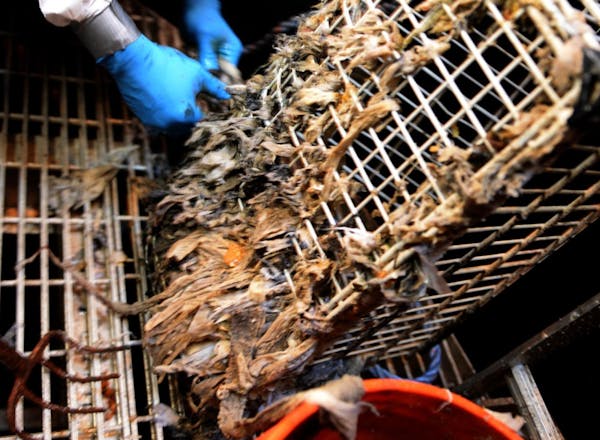Crews working in the bowels of the Twin Cities metro area's vast sewage system are "spending a significant amount of time" removing "flushable" wipes from water treatment equipment, the facilities' operators are reporting.
The Metropolitan Council Environmental Services (MCES) said Wednesday it now devotes a weekend's worth of crew time solely to extracting these materials from sewer screens to keep pumps and pipes clog-free. The regional agency is joining other communities in Minnesota and nationwide in voicing frustration with the widely used wipes and other personal hygiene materials being flushed down toilets.
"If you can throw it in the trash, don't throw it down the toilet," Tim Keegan, manager of interceptor services, said in a lengthy online posting by MCES, which included photographs to illustrate the point. "It's difficult to quantify, but we are spending a significant amount of time and money removing wipes and other non-flushable materials from regional sewers."
The usage of wet wipes has spread far beyond babies' bums in recent years, with adults finding them more effective than dry toilet paper. Nursing homes, hospitals and classrooms are also common locales for the use of wet wipes by the non-baby diaper set.
Along with wipes that are not dissolving in the sewer pipes, MCES crews are also finding rags, grease, oils, sanitary products and dental floss gumming up the works as 250 million gallons of wastewater is treated each day from more than 100 communities in the metropolitan area.
Dental floss not only doesn't dissolve, it can easily wrap around other materials and create a larger mass of obstruction, Keegan said.
"We know people will accidentally drop things down the drain — jewelry, small toys, cellphones, wallets, and the like," he said. "But we are trying to reduce the materials that are put down the drain on purpose."
Across Minnesota and the country, cities have been cautioning residents not to flush wipes, which have forced them to boost their monitoring and buy expensive grinders.
In April, the city of Wyoming, just north of the Twin Cities area, sued six makers of "flushable" wet wipes in federal court. The suit said the wipes "remain intact long enough to pass through private wastewater drain pipes into the municipal sewer line, causing clogs and other issues for municipal and county sewer systems and wastewater treatment plants, resulting in thousands, if not millions, of dollars of damages."
MCES operates eight wastewater treatment plants, 600 miles of regional sanitary sewers, and 62 pumping stations that push wastewater through the sewer pipes to the treatment plants. While the screens that MCES has installed protect many of the pumps, sometimes the wipes and other non-dissolvable materials get through the screens and clog the pumps, Keegan said.
MCES said it is crafting a public education campaign on the issue and will work with the cities it serves to get the word out to residents and businesses.
As a member of the National Association of Clean Water Agencies (NACWA) and the Water Environment Federation, MCES said it supports the efforts of these and similar organizations in pursuing improved labeling by manufacturers of flushable vs. non-flushable products and increased efforts to educate users about the do's and don'ts of wipes and other non-dissolvable items.
NACWA Executive Director Ken Kirk said his association wants to work "with the wipes industry to help improve consumer awareness about products that should and should not be flushed. Toilets are not trash cans, and reducing the amount of inappropriately flushed products will save utilities millions of dollars each year."
In response to the municipal outcry, industry representatives have argued that people are flushing cloths that never claimed to be flushable, such as cheap baby wipes, meant to be bundled in disposable diapers and thrown in the trash.
That industry has "empathy for the challenges the wastewater operators are having with non-flushable materials impacting their systems," said Dave Rousse, president of the Association of Nonwoven Fabrics Industry, a trade group representing manufacturers of wipes and other products. "However, we take great exception to any effort to blame flushable wipes for the problems being caused by non-flushable wipes."
Makers of wipes — including baby, facial and cleaning wipes — have faced increased criticism as their industry has grown. In 2014, a New York man sued Kimberly-Clark Corp. and Costco Wholesale Corp. in federal court with a class-action-styled complaint that featured "homeowner horror stories" of "flushable" wipes clogging homes' plumbing.
Bob Brand, a spokesman for Kimberly-Clark, one of the defendants named in Wyoming's suit, said the company does "extensive testing" on the wipes it calls "flushable." Brand said, "Our wipes do break down."
Paul Walsh • 612-673-4482

Souhan: This is KAT's chance to prove Flip Saunders was right

